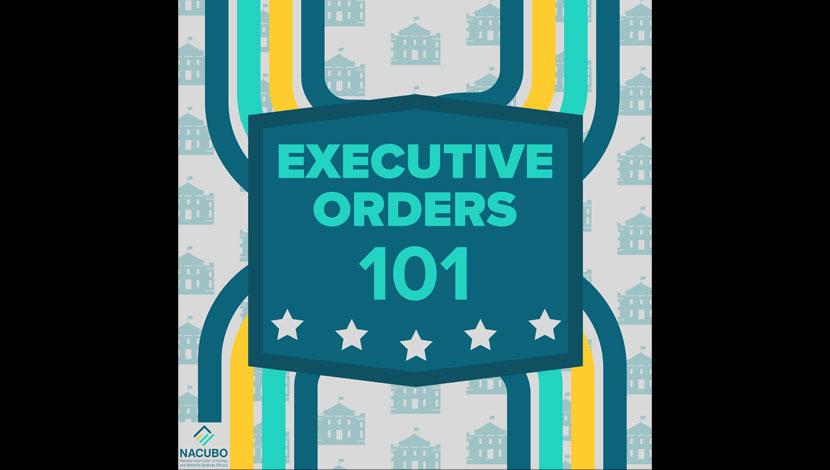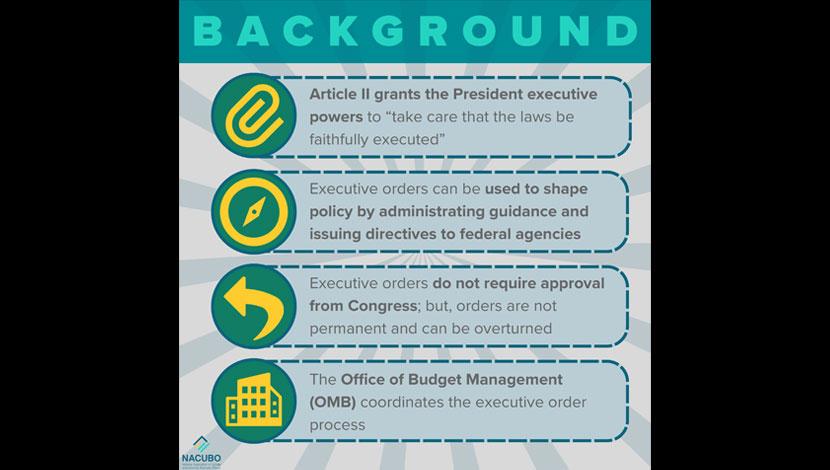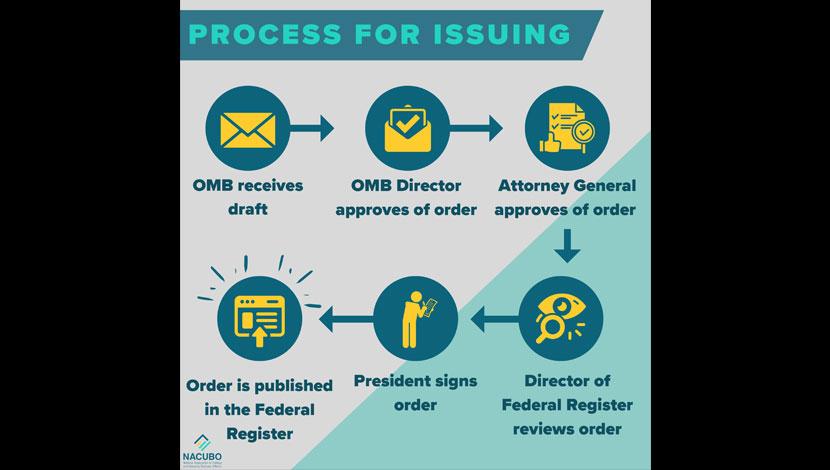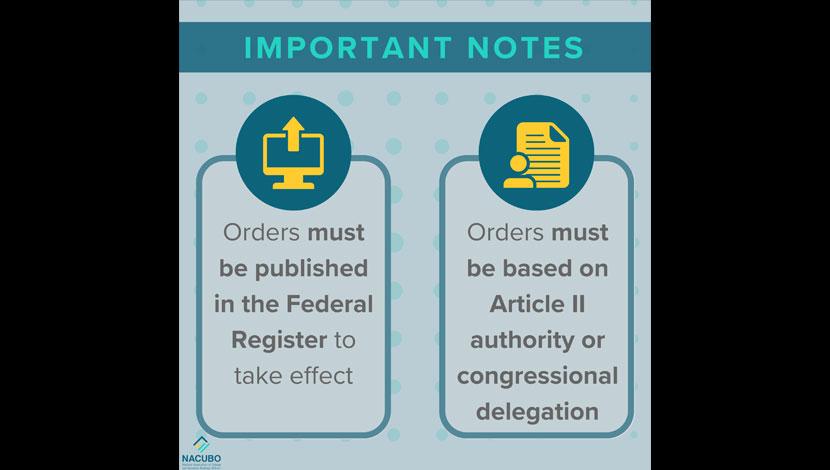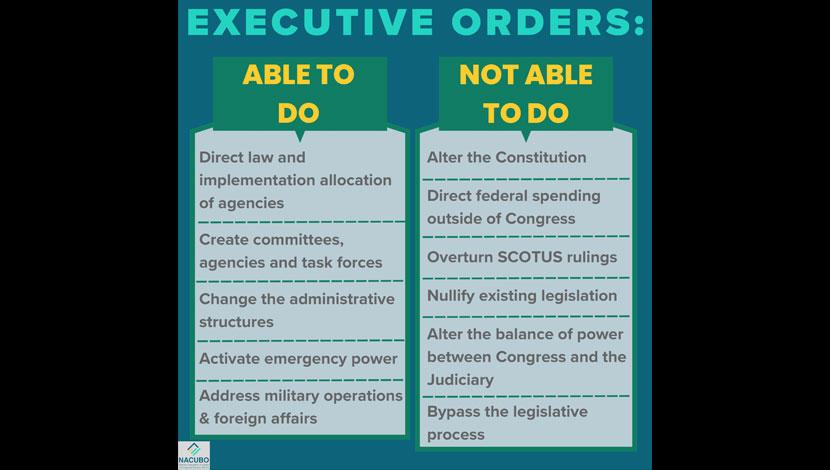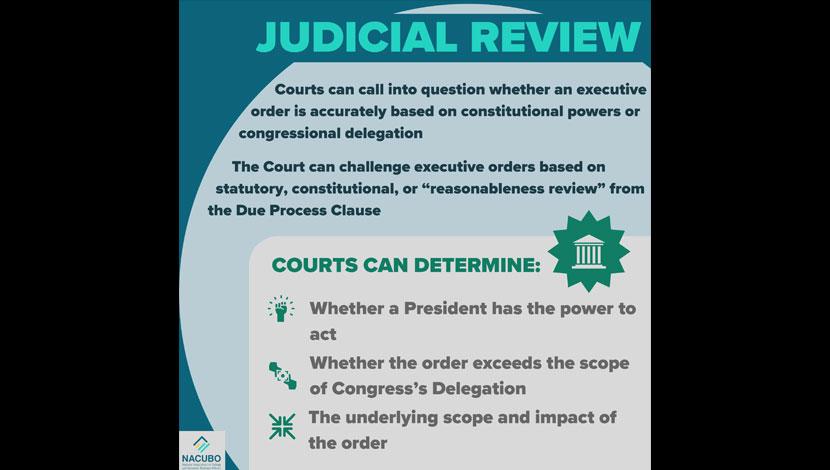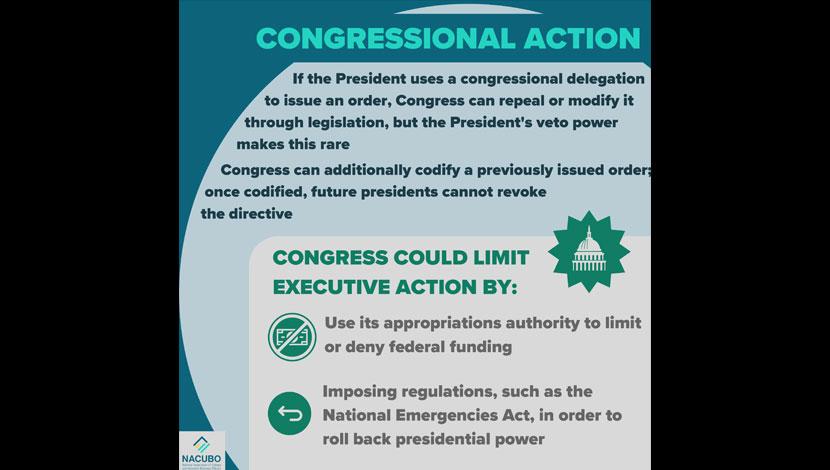Federal Executive Orders
Updates and Guidance Related to Federal Executive Orders, Memos and Agency Guidance
Updated: September 23, 2025
As the federal landscape evolves, we are committed to providing information about executive orders, memorandums and guidance.
While many of these directives are still being evaluated to understand impact, we will provide updates as information is verified. This page serves as a central hub for updates and resources related to relevant federal actions.
Executive Orders by Topic
-
Research
- August 7, 2025:
- June 17, 2025:
- June 16:
- June 11, 2025:
- May 28, 2025:
- May 14, 2025:
- May 5, 2025:
- May 5, 2025:
- May 2, 2025: NSF Memo:
- April 23, 2025:
- April 21, 2025:
- April 18, 2025:
- April 14, 2025:
- April 11, 2025:
- April 4, 2025:
- April 4, 2025:
- March 27, 2025:
- March 6, 2025:
- March 5, 2025:
- February 27, 2025:
- February 21, 2025:
- February 10, 2025:
- February 10, 2025:
- February 7, 2025:
- January 31, 2025:
- January 29, 2025:
- January 28, 2025:
- January 28, 2025:
- January 27, 2025:
- January 21, 2025:
Additional Information:
On January 21, the U.S. Department of Health and Human Services (HHS) issued a pausing public communications from all HHS agencies—including the CDC, FDA and NIH—and subsequently instructed staff to suspend all work-related travel and grant reviews. On February 4, HHS issued internal guidance and procedures allowing certain external communications, travel and grant reviews to resume.
On January 27, the White House Office of Management and Budget (OMB) issued a memo directing federal agencies to temporarily pause all activities related to federal financial assistance or that may be implicated by recent executive orders. On January 29, a federal judge in the District of Columbia issued a on the memo. OMB the same day but continued to pause certain federal financial assistance. On January 31, another federal judge in Rhode Island granted a (TRO) blocking the administration from freezing federal loans, grants and other financial assistance. On February 10, that federal judge in response to claims that federal agencies continue to improperly freeze federal funds.
On February 7, the National Institutes of Health (NIH) issued a that, effective immediately, all payments made by the NIH to universities, hospitals, research institutions and other grantees for “indirect costs”—which include costs related to facilities and administration—will be capped at a 15% rate. The change applies to both new and existing grant awards. On February 10, 22 state attorney generals, including Attorney General Anthony Brown for the State of Maryland, to seek injunctive relief from the NIH notice. The same day, a federal judge in Massachusetts issued a (TRO) preventing the NIH from enacting the rate change.
On February 10, 22 state attorney generals, including Attorney General Anthony Brown for the State of Maryland, to seek injunctive relief from the NIH notice. The same day, a federal judge in Massachusetts issued a (TRO) preventing the NIH from enacting the rate change. On February 21, that judge until a further order is issued resolving the request for a preliminary injunction.
On February 27, the administration issued an executive order titled The order seeks to review and centralize all federal discretionary payments, including grants, projects and loans, under DOGE. Agency heads are tasked with immediately reviewing all grants and contracts and, notably, "the process... shall prioritize the review of funds disbursed under covered contracts and grants to educational institutions and foreign entities for waste, fraud, and abuse." Each agency head is instructed to complete this review within 30 days and determine if terminations or modifications are needed in order to promote efficiency or decrease spending. Once the review is completed, agency employees are instructed to publicly submit "brief, written justifications" prior to that employee's approval of a future payment for covered contracts and grants. There are also provisions freezing agency employee travel.
On March 27, the administration issued an executive order titled The order impacts the Smithsonian Institution and "prohibit[s] expenditure on exhibits or programs that degrade shared American values, divide Americans based on race, or promote programs or ideologies inconsistent with Federal law and policy," which could have implications on projects conducted in partnership with Smithsonian museums and research centers.
On April 4, 16 state attorneys general, including Maryland Attorney General Anthony G. Brown, filed a seeking injunctive relief against the Department of Health and Human Services (DHHS) and the National Institutes of Health (NIH). The lawsuit argues that "by postponing meetings, delaying the review of pending applications, failing to issue final recommendations, and terminating issued grants, NIH is failing to meet its statutory obligations and violating applicable regulations."
On April 11, the Department of Energy that, similar to the previous announcement by the National Institutes of Health, it would cap indirect cost rates for colleges and universities at 15%. The announcement further states that, "Consistent with this memorandum, the Department is undertaking action to terminate all grant awards to IHEs that do not conform with this updated policy." On April 14, the Association of Public Land-grant Universities (APLU), the Association of American Universities (AAU), and the American Council on Education (ACE) filed a against the Department of Energy seeking a halt to the proposed indirect cost rate cut.
On April 18, the National Science Foundation (NSF) issued on agency priorities. The guidance states that research projects with more narrow impact limited to subgroups of people based on protected class or characteristics do not effectuate NSF priorities. The guidance further states that NSF will not support research with the goal of combating ‘misinformation,’ ‘disinformation,’ and ‘malinformation'. All awards that “are not aligned” with NSF’s mission have been terminated and this guidance will apply to future funding considerations.
On April 21, the National Institutes of Health (NIH) issued for all new, renewal, supplement, or continuation awards issued on or after the date of the notice. The new terms require applicants to certify that they do not, and will not during the term of this financial assistance award, operate any programs that advance or promote DEI, DEIA, or discriminatory equity ideology in violation of Federal anti-discrimination laws. Applicants must also verify that they do not engage in and will not during the term of this award engage in a discriminatory prohibited boycott.
On April 23, the administration issued an executive order titled The order directs the Secretary of Education to "take appropriate to require universities to more specifically disclose details about foreign funding, including the true source and purpose of the funds," and to conduct audits, investigations and enforcement actions on institutions deemed non-compliant.
On May 2, the National Science Foundation that, similar to the previous announcements by the National Institutes of Health and the Department of Energy, it would cap indirect cost rates for colleges and universities at 15%. On May 5, the Association of American Universities, the American Council on Education, and the Association of Public and Land-grant Universities to prevent the implementation of a 15% cap. The NSF has paused the policy until a hearing is held on June 13.
On May 5, the administration issued an executive order titled The order restricts federal funding of "gain-of-function" research which may affect funding and compliance requirements for university researchers whose research involves potentially dangerous pathogens.
On May 14, the Department of Defense that, similar to the previous announcements by the National Institutes of Health, the Department of Energy and the National Science Foundation, it would cap indirect cost rates for colleges and universities at 15%.
On May 28, 16 state attorneys general, including Maryland Attorney General Anthony G. Brown, filed a against the NSF seeking an injunction against new NSF policies impacting research funding.
On August 7, the administration issued an executive order titled The order establishes new oversight measures in order to better align federal discretionary grants with agency priorities and the “national interest.” It introduces structural changes affecting how grants are proposed, reviewed, approved and administered.
-
Education
-
August 19, 2025:
-
August 7, 2025:
- March 20, 2025:
Additional Information:
On March 20, 2025, the administration issued an executive order titled The order calls for the dismantling of the Department of Education. The order directs the Secretary of Education to take "all necessary steps to facilitate the closure of the Department of Education and return education authority to the States, while continuing to ensure the effective and uninterrupted delivery of services, programs, and benefits on which Americans rely." Additionally, the order directs that "programs or activities receiving any remaining Department of Education funds will not advance DEI or gender ideology." Closure of a Cabinet-level agency would require the approval of Congress.
On August 7, the President issued a memorandum titled . The order directs the Secretary of Education to expand the admissions data that institutions of higher education are required to submit, conduct more robust checks of admissions data and, if necessary, pursue enforcement actions. The order aims to eliminate the use of race as a factor of consideration in admissions.
On August 19, the Department of Education issued prohibiting Federal Work Study (FWS) funds from being used to employ students whose work “involves any partisan or nonpartisan political activity," including voter registration, voter assistance or polling place staffing.
-
-
Diversity
- August 14, 2025:
- July 29, 2025:
- April 23, 2025:
- March 5, 2025:
- March 1, 2025:
- February 21, 2025:
- February 14, 2025:
- February 13, 2025:
- February 4, 2025:
- January 29, 2025:
- January 21, 2025:
- January 20, 2025:
Additional Information:
On January 20, the administration issued an executive order titled This order requires federal agencies to terminate “equity-related” grants or contracts and all DEI or DEIA performance requirements for employees, contractors or grantees, and directs agencies to provide a list of contractors who have provided DEI training or training materials to federal employees and all grantees who have received federal funding to “provide or advance DEI, DEIA, or ‘environmental justice’ programs, services or activities since January 20, 2021.” On January 31, a federal judge issued a preventing the freeze of federal loans, grants and other financial assistance, including grants with DEIA components. Please reach out to the Office of Graduate Studies and Research if you receive a stop-work order on a federal grant for review of DEIA components.
On January 21, the administration issued an executive order titled The order eliminates all diversity, equity and inclusion programs in the federal government; directs each agency to identify “up to nine potential civil compliance investigations” of organizations including higher education institutions; and instructs the U.S. Attorney General and Secretary of Education to issue guidance to all higher education institutions that receive federal funding on compliance with the Supreme Court ruling banning race-conscious admissions.
On January 29, the administration issued an executive order titled The order instructs a number of federal agencies to identify administrative or legal complaints of antisemitism after October 7, 2023 involving higher education institutions; and directs the U.S. Secretary of State, Secretary of Education and Secretary of Homeland Security to provide a report and recommendations to familiarize institutions of higher education with the grounds for inadmissibility into the U.S. so that institutions may “monitor for and report activities” by international students, faculty and staff “relevant to those grounds.”
On February 4, the Office of Civil Rights (OCR) within the Department of Education issued to K-12 schools and institutions of higher education advising educators and administrators that OCR will enforce Title IX using the interpretation of “sex” to mean “the objective, immutable characteristic of being born male or female.”
On February 5, the administration issued an executive order titled This order bans transgender athletes from competing in women’s and girl’s school-sponsored athletics. The order would further prioritize Title IX enforcement actions against educational institutions that allow transgender athletes to compete in women's and girls sports programs and instructs all federal agencies to rescind funding to programs that fail to comply with the policy.
On February 13, the Attorneys General of 16 states, including Maryland Attorney General Anthony Brown, issued concerning Diversity, Equity, Inclusion and Accessibility (DEIA) employment initiatives.
On February 14, the acting Assistant Secretary for Civil Rights in the Department of Education sent a outlining new guidance for compliance with and enforcement of Title VI. More guidance from the Department of Education is expected.
On February 21, a federal judge in Maryland issued a preventing the administration from implementing bans on diversity, equity and inclusion programs operated by federal agencies and federal grant and contract recipients, as ordered in the President's executive orders titled "Ending Radical and Wasteful Government DEI Programs and Preferencing" and "Ending Illegal Discrimination and Restoring Merit-based Opportunity." Under the TRO, the administration may not "pause, freeze, impede, block, cancel, or terminate any awards, contracts or obligations ('Current Obligations'), or change the terms of any Current Obligation," on the basis of these executive orders. The administration also cannot require any grantee or contractor to make any "certification" around DEI in their submissions for funding.
On March 5, 15 state attorneys general, including Maryland Attorney General Anthony Brown, issued to institutions of higher education and K-12 schools in response to federal orders and agency guidance regarding diversity, equity, inclusion and accessibility.
On April 23, the administration issued an executive order titled The order directs the Attorney General and the Secretary of Education to suspend or terminate the accreditation recognition of accrediting bodies that "engage in unlawful discrimination in accreditation-related activity under the guise of 'diversity, equity, and inclusion' initiatives."
On July 29, the Department of Justice issued a containing new guidance for recipients of federal funding. The memo outlines the "significant legal risks of initiatives that involve discrimination based on protected characteristics and provides non-binding best practices to help entities avoid the risk of violations." The guidance specifically references DEI programs, cultural competency and geographic targeting as examples of unlawful discrimination based on protected characteristics.
-
International 抖阴社区短视频, Faculty and Staff
- August 28, 2025:
- June 23, 2025:
- June 20, 2025:
- June 4, 2025:
- June 4, 2025:
- May 28, 2025:
- April 10, 2025: filed by 86 institutions and associations, including the University System of Maryland, supporting a preliminary injunction to stop the revocation of student visas without cause and arresting, detaining and deporting noncitizen students and faculty.
- March 19, 2025:
- January 20, 2025:
- January 20, 2025:
- January 20, 2025:
Additional Information:
On January 20, the administration issued an executive order titled This order directs the Secretary of State, in coordination with other federal agencies, to enhance vetting for all visa applicants including F-1 and J-1 students, and directs the departments of State and Homeland Security to ensure that applicants “do not bear hostile attitudes” toward U.S. institutions. These provisions could impact visa processing.
On January 20, the administration issued an executive order titled The order ends birthright citizenship—which grants citizenship to all people born in the U.S.—and extends to individuals born to mothers lawfully but temporarily in the U.S. where the father was not a U.S. citizen or lawful permanent resident. This order has been temporarily blocked by several federal judges.
On January 20, the administration issued an executive order titled The order directs the Department of State to align all policies and programs with an “America First” approach, which could have implications for international exchange and study abroad programs funded by the Department of State.
On March 19, the university received a from the House Select Committee on the Chinese Communist Party requesting information on our policies and practices regarding the enrollment of Chinese national students in advanced STEM programs and federally funded research. The committee sent the letter to five other universities, including Carnegie Mellon, Purdue University, Stanford University, the University of Illinois, and the University of Southern California. It is our understanding that the request for information is not seeking personally identifiable information. The university therefore intends to respond accordingly, and otherwise consistent with federal and state privacy laws, by the deadline of April 25.
On April 10, the University System of Maryland joined 85 other institutions and associations in signing an to support a lawsuit against the federal government over its revocation of student visas.
On May 28, the U.S. Department of State issued a stating that they "will work with the Department of Homeland Security to aggressively revoke visas for Chinese students, including those with connections to the Chinese Communist Party or studying in critical fields." If you are a student and have been notified of a visa revocation, please immediately contact the .
On June 4, President Trump signed a that "fully restricts and limits the entry of nationals" from 12 countries: Afghanistan, Burma, Chad, Republic of the Congo, Equatorial Guinea, Eritrea, Haiti, Iran, Libya, Somalia, Sudan and Yemen. The order further "partially restrict[s] and limit[s] the entry of nationals" from an additional 7 countries: Burundi, Cuba, Laos, Sierra Leone, Togo, Turkmenistan, and Venezuela. The proclamation includes exceptions for
On June 20, the U.S. Department of State issued an outlining new guidelines for the vetting of all student and exchange visitor applicants in the F, M, and J nonimmigrant classifications. The announcement states that "all applicants for F, M, and J nonimmigrant visas will be instructed to adjust the privacy settings on all of their social media profiles to 'public.'”
On June 23, U.S. Customs and Border Protection released regarding the search of electronic devices at ports of entry, stating that all travelers crossing the United States Border are subject to CBP inspection, including on occasion the search of "a traveler’s mobile phone, computer, camera, or other electronic devices during the inspection process." The guidelines further state that "border searches of electronic devices are often integral to determining an individual’s intentions upon entry to the United States and thus provide additional information relevant to admissibility of foreign nationals under U.S. immigration laws."
On August 28, the Department of Homeland Security (DHS) and U.S. Immigration and Customs Enforcement (ICE) proposed that would limit F-1 and J-1 visa holders to a maximum stay of four years before they must apply to extend their legal status.
-
Undocumented Individuals
- April 28, 2025:
- January 21, 2025:
- January 20, 2025:
Additional Information:
On January 20, the administration issued an executive order titled This order requires the U.S. Attorney General and the Secretary of Homeland Security to review contracts, grants and agreements between the federal government and “non-governmental organizations supporting or providing services, either directly or indirectly, to removable or illegal aliens.”
Separately, the Department of Homeland Security (DHS) issued a rescinding a long-standing policy that identified schools, hospitals and churches as “sensitive locations” and limited them from immigration enforcement actions. As a result, Immigration and Customs Enforcement (ICE) will no longer treat these “sensitive locations,” including college campuses, differently from other locations.
On April 28, the administration issued an executive order titled The order directs the Attorney General to publish a list of state and local jurisdictions with "sanctuary" policies. The order further orders the Attorney General and Secretary of Homeland Security to "stop the enforcement of State and local laws, regulations, policies, and practices favoring aliens over any groups of American citizens that are unlawful, preempted by Federal law, or otherwise unenforceable, including State laws that provide in-State higher education tuition to aliens but not to out-of-State American citizens."
-
Athletics
- July 24, 2025:
- February 5, 2025:
Additional Information:
On February 5, the administration issued an executive order titled This order bans transgender athletes from competing in women’s and girl’s school-sponsored athletics. The order would further prioritize Title IX enforcement actions against educational institutions that allow transgender athletes to compete in women's and girls sports programs and instructs all federal agencies to rescind funding to programs that fail to comply with the policy.
On July 24, the administration issued an executive order titled, The order contains: prohibitions on third parties engaging in direct "pay-for-play" payments to athletes and guidance that players should only earn "fair market value" for services to third parties; requirements that schools maintain or increase scholarships for nonrevenue sports; guidance on the employment status of college athletes; and protections for the NCAA against litigation.
Resources
- Campus Resources
-
AAU
- February 7, 2025:
- January 29, 2025:
- January 28, 2025:
-
ACE
- January 28, 2025:
- January 27, 2025:
-
COGR
About Executive Orders
The slideshow below was created by the and outlines the process of issuing (the President) and responding to (Congress and Judiciary) executive orders.

